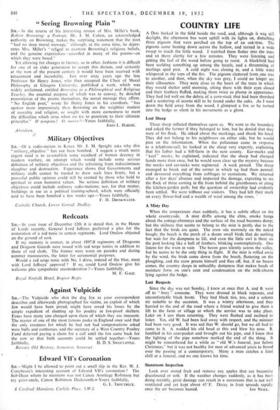" Seeing Browning Plain "
SIR,—In the course of his interesting review of Mrs. Miller's book, Robert Browning: a Portrait, Mr. J. M. Cohen, an acknowledged authority on Browning, makes the surprising statement that the poet " had no deep moral message," although, at the same time, he depre- cates Mrs. Miller's " reftel to examine Browning's religious beliefs, and the genuine experiences—recorded in many of the poems—on which they were based."
Yet allowing for changes in literary, as in other, fashions it is difficult for one of an older generation to, accept this dictum, and certainly at the turn of the present century it would have been received with -amazement and incredulity. Just over sixty years ago the late Professor Sir Henry Jones, who then occupied the Chair of Moral Philosophy at Glasgow University, published a work, which was widely acclaimed, entitled Browning as a Philosophical and Religious Teacher, the essential purpose of which was to convey, by detailed examination of the poems themselves, the moral message they affirm. " No English poet," wrote Sir Henry Jones in his exordium, " has spoken more impressively than Browning on the weightier matters of morality and religion, or sought with more earnestness to meet. the difficulties which arise when we try to penetrate to their ultimate principles." 0 tempora ! 0, mores !—Yours faithfully,
A berdeen.
JOHN L. HARDIE.


































 Previous page
Previous page